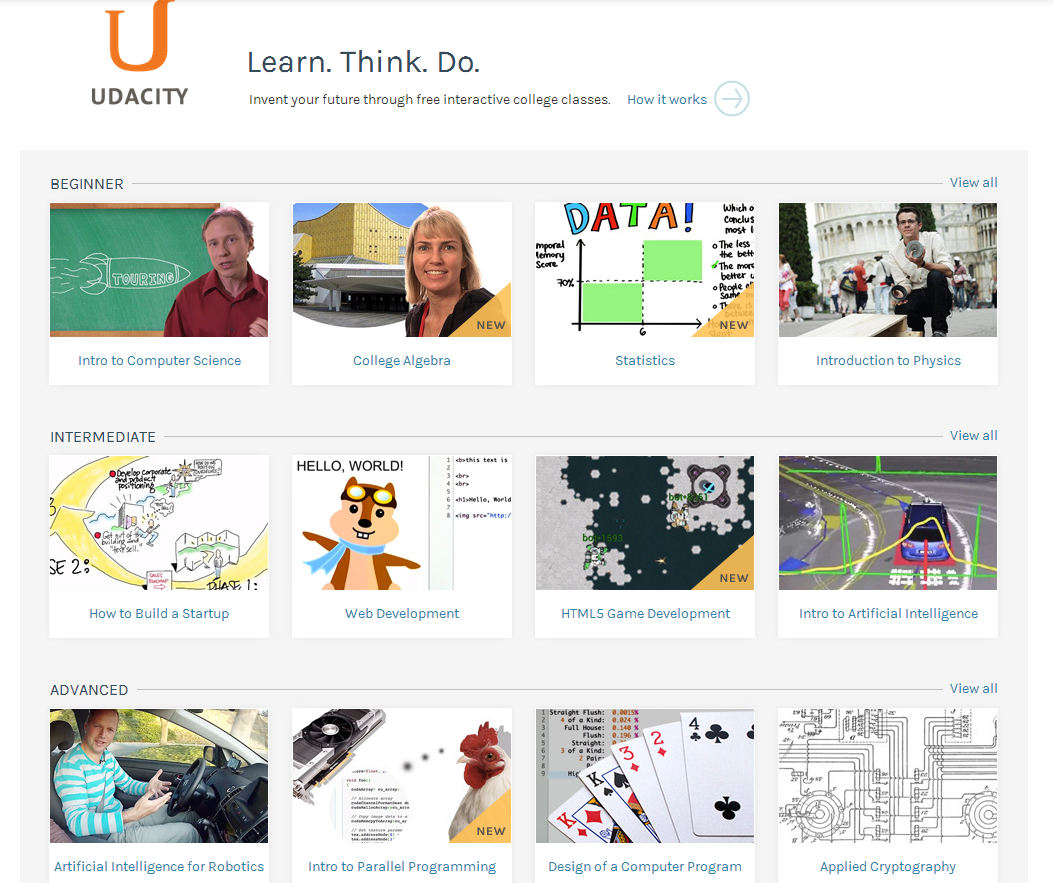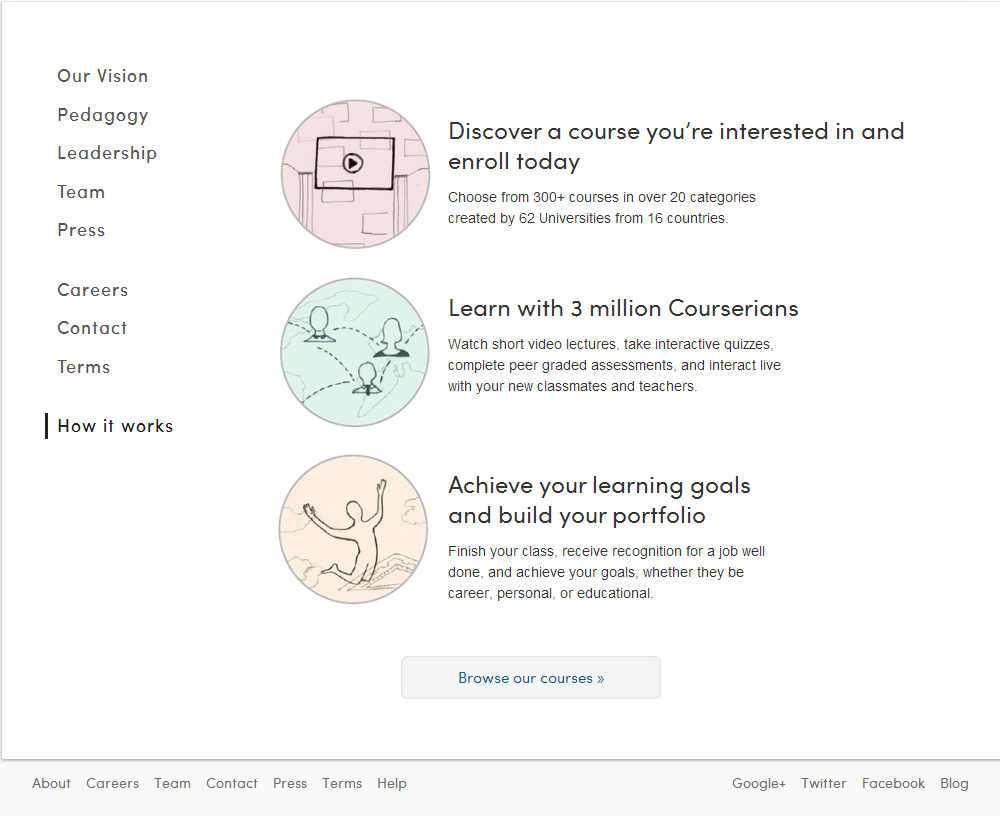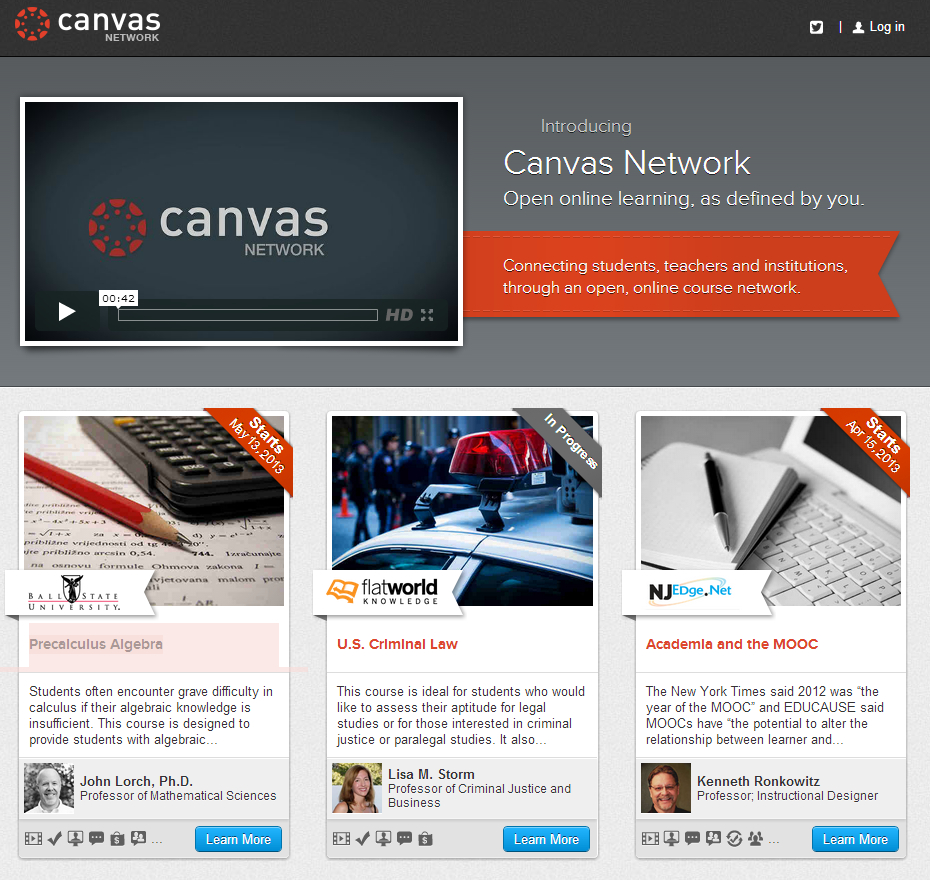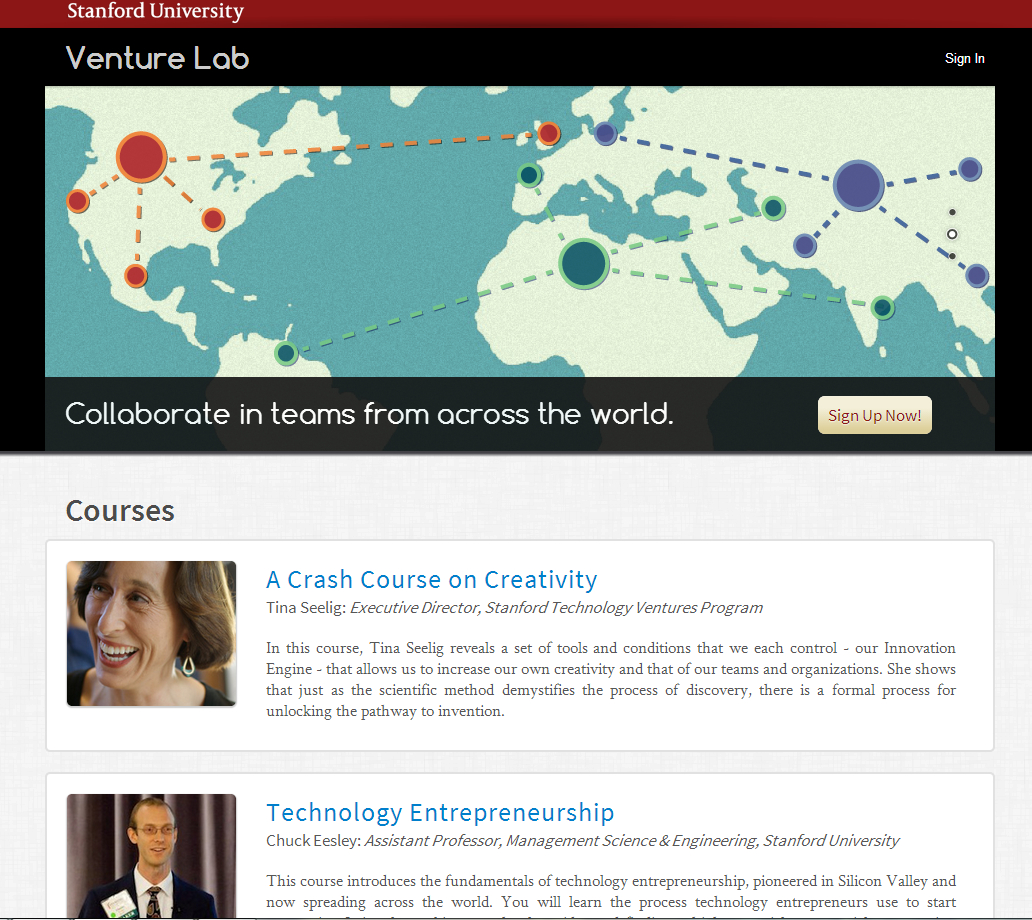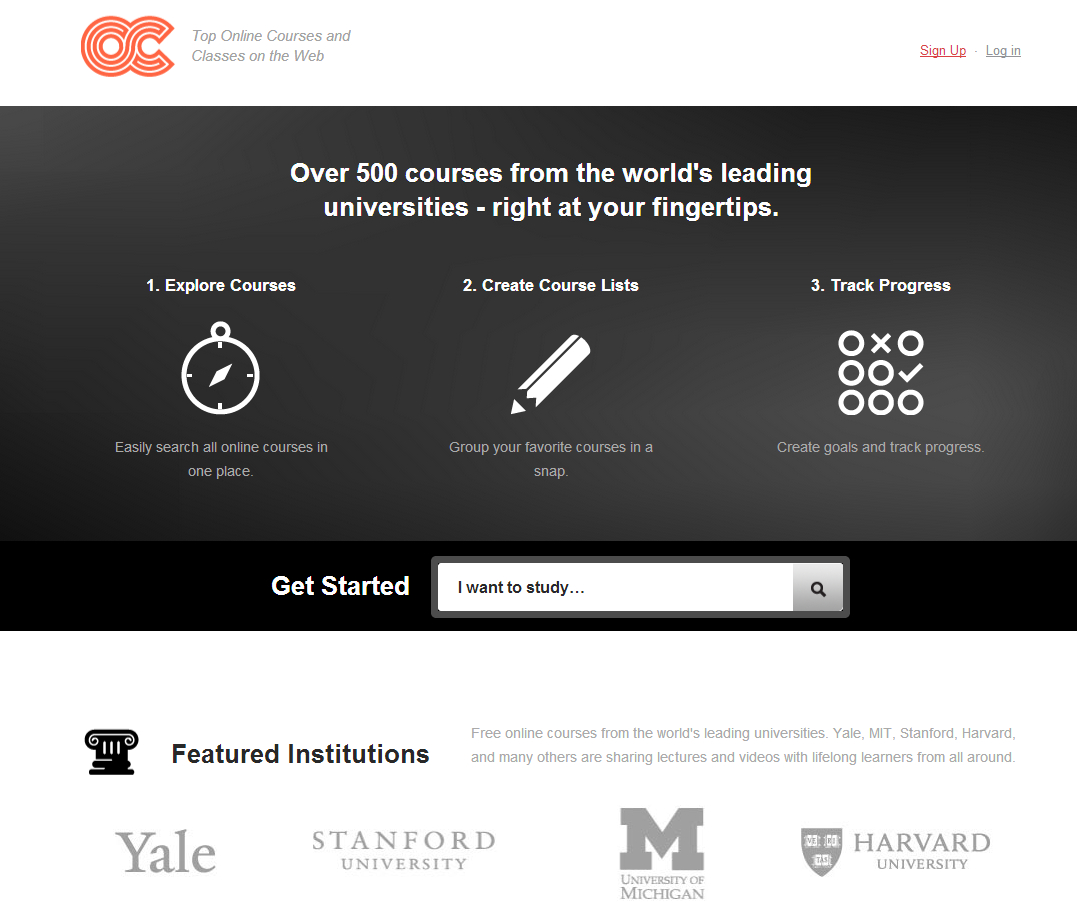CONTINUING EDUCATION (MOOCs)
In the last four years, a significant and growing development in continuing education possibilities is the Massive Online Open Course or MOOC. MOOCs are free and available to anyone with access to the Internet, they are offered in a range of subjects, they can be interactive, self-paced, or collaborative; some have a calendar-based schedule, and others can be taken anytime. While Stanford, MIT and Harvard have been pioneers in this movement, other institutions and universities are quickly climbing onto the open learning bandwagon as well. There are a number of platforms for accessing MOOCs. Some, like Coursera offer a wide and diverse array of course offerings, and other platforms, like VentureLab, offer limited and very specialized courses. Udemy provides a platform enabling anyone with expertise in something to develop and provide a course online. Some platforms primarily serve as search and tracking platforms: like OnlineCourses and Class Central. Evaluation of the MOOC learning experience, accreditation, copyright issues, the benefits or otherwise of open licensing of content, and the long-term implications for academic institutions, is still in its early stages, but overall there is an excitement over these new developments that offer unprecedented access to high-quality educational opportunities and collaborations. Below are some of the main platforms for accessing MOOCs, with some attempt to point out what differentiates one from the next.
Coursera
Started by Stanford professors Daphne Koller and Andrew Ng, Coursera has the largest offering of open online courses, spanning the humanities, medicine, biology, social sciences, mathematics, business, computer science and many others. Peer graded assignments facilitate interaction with classmates. The courses vary in length and are based on “sound pedagogical foundations” to help students master new concepts quickly, including providing frequent feedback to help students monitor progress. Apparently 3,074,945 have registered for courses through Coursera.
What’s different: 1) Coursera has the largest offering of open online courses: there are over 300 courses, from 62 Universities, offered in 20 categories. 2) Courses have defined start and end dates.
Udacity
Udacity was started by Sebastian Thrun at Stanford University. It offers primarily computer science and mathematics courses that can be taken any time. Students can track their progress and obtain a certificate at completion.
What’s different: Udacity has arrangements with 412 companies that have shown an interest in hiring students who have completed Udacity courses.
EdX was founded by Harvard University and the Massachusetts Institute of Technology in partnership wiht a diverse array of course offerings. They now have online courses from Berkeley, Wellesley, Georgetown, and the 9 colleges from the University of Texas system. In 2013 they plan to add courses from Ecole Polytechnique Federale de Lausanne, McGill, University of Toronto, Australian National University, Delft University of Technology and Rice University.
What’s different: 1) Focus on quality: representative institutions carefully chosen 2) Courses are open and free to anyone, however certificates of mastery will be awarded for demonstrating mastery of subject, with plans to charge a modest fee for the certificates in the future (currently certificates are being withheld for Cuba, Iran, Syria and Sudan in compliance with US Embargoes). 3) MIT, Harvard & Berkeley will use this platform to research how students learn and how technology can transfer learning both on-campus and online throughout the world.
Open2Study, an Australian site, lists free courses, all four weeks in length, with specified start and end dates. Video instruction and private classroom discussion boards facilitate online discussions. Certificates of achievement are provided for completion of at least 3 of the 4 assignments and achievement of at least 60% in the course.
What’s different: 1) Open2Study is creating a points and badges system to recognize and reward perseverance and leadership. 2) It encourages further study by providing information on related careers and added qualifications and certifications one needs to pursue that interest.
A platform from Stanford University to offer free online courses, VentureLab currently offers 9 courses specifically geared towards innovation and entrepreneurship that are taught by Stanford professors, and that encourage experiential, interactive and collaborative learning.
What’s different: Limited, but specialized course offerings that encourage interactive and collaborative learning.
A platform that connects “students, teachers and institutions” through an open online course network, all these courses are free, but some have limited enrolment, some may provide opportunities for interaction with the instructor and with other students; some may include team projects, and some may need to purchase or subscribe to fee-based course materials. Credit can be obtained for some of these courses with a proctored end-of-course exam and that may involve a fee as well.
What’s different: Type of courses offered are more practical, some courses are available for earning university credit, it seems there are smaller classes and limited enrolments for some course offerings.
Udemy is described as a virtual "learning service" providing online video education. It provides a platform that allows anyone (novice or seasoned) with a particular expertise to provide an online course. It helps teachers take ownership of their offerings through provision of tools, like a curriculum editor, that helps provide well-structured curricula, as well as tools that help organize, manage and promote their courses. Udemy's courses can be taken any time, they are all fee-based, and they tend to be practical and focussed towards learning of skills and techniques.
What's different: Anyone with expertise, can provide a course. All courses are fee-based. The courses can be accessed anytime and anywhere and are focussed on learning specific skills and techniques.
SEARCHING FOR COURSES
OnlineCourses is a free online aggregator of free open online courses (currently around 500) from different institutions, classified into 24 subject areas. The platform allows searching for courses (choosing the Accounting subject area, for example, we can view the 12 courses currently listed). To know more about the course, we are taken to information on the institution’s website, from where course materials can be downloaded.
What’s different: The platform allows searching for courses, creating course lists and tracking progress. The courses themselves are accessed from the websites of the institutions where they are offered.
Class Central is a free online course aggregator that presents links to courses from Coursera, Udacity, edX, Canvas network, VentureLab and OpenHPI (a German MOOC), in a tabular format, listing Course Name, Instructor, Stream (Subject area); Start Date, Length and Initiative (Coursera, Udacity etc.). For example, there are currently 61 that have recently started or are starting soon, 54 that have just been announced, 128 currently in progress, 291 future courses, 29 self paced courses and 143 finished courses. The site also has a news and blog sections for updates and a search feature.
What’s different: Makes it easy to scan across platforms, dates, instructors and courses to find and access courses of interest.
Online Library and Information Science Degree Programs
This page was updated by Chanelle Pickens, Masters in Library Science, San Jose State University, in June 2021. It describes the skills and competencies that a typical MLIS degree develops, offers some information on entry requirements and programs of study, and careers that MLIS graduates can pursue. The article describes schools in the USA, but there may be schools offering programs in other countries (for example, the online option at Master of Library and Information Studies | School of Library and Information Studies (ualberta.ca) in Canada, that is also ALA accredited)

